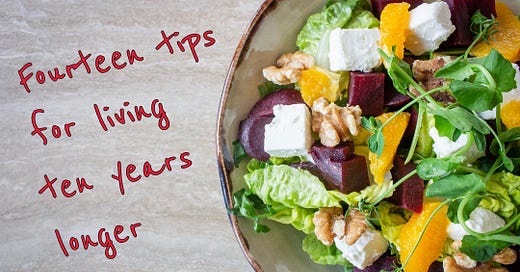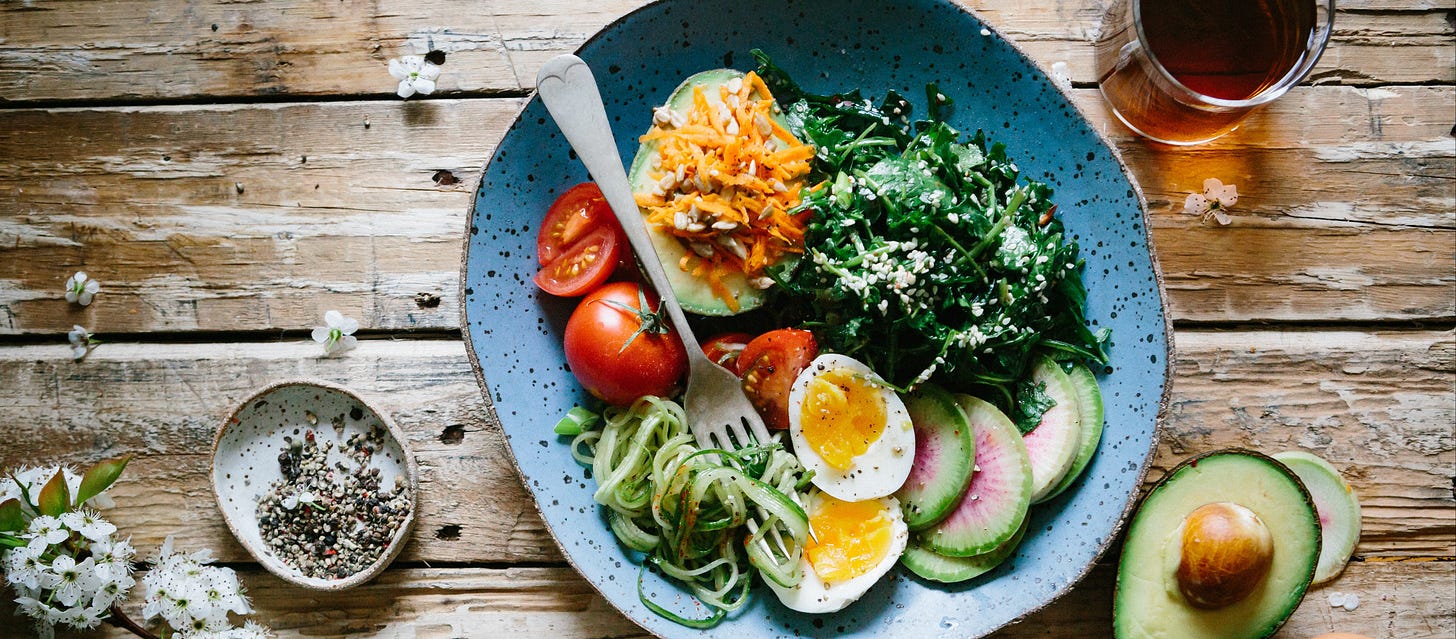Fourteen tips for living ten years longer.
This scientifically developed, easy-to-understand decision support model predicts how dietary choices affect your life expectancy.
Nearly two years into the pandemic, I'm starting to worry less about the virus and more about my lifestyle. I haven't been to the gym for two years; I walk less, travel less, and spend more time indoors. I also gained weight and should pay more attention to what I eat and how much I eat.
Sounds familiar? Especially that eating remark? Stay on this page if you recognize any of this. You are not alone; we are with many.
This newsletter is primarily about the beauty and the health of our planet, but we shouldn't ignore our own health. If we make better choices in what we eat, we can live longer and healthier. Of course, you knew this, but how much longer will you live if you eat better? And where do you start? You fear getting lost in the thousands of publications.
How to live five or ten years longer
Here is a good start for you; within the next five minutes, you will learn how you can live some five or ten years longer. That's a good return on investment.
A recently published study helps you make better decisions about your diet based on innovative methods that integrate the best available evidence. The researchers published an easy-to-understand decision support model that predicts how dietary choices affect life expectancy. The options are so easy to follow, with so many predicted positive effects, that I believe everyone should be aware of the conclusions.
The predictions for living longer are pretty stunning. For example, if you are a woman at the age of 60 and now eat a typical western diet (be honest: what did you eat in the past 24 hours?) and change today to the optimized diet, you can increase your life expectancy 8.0 years. For men at 60, it is even higher: 8.8 years.
These are population estimates under given assumptions, and the study lists several limitations. So in your specific situation, the gains from a healthier diet could result in less impressive gains (or perhaps even more!). But I love life so much that I would be willing to improve my diet if I gain only a few years or even a few months extra. The stunning results of this study indicate that it may well be much more.
So what do you have to eat to live healthier and longer? And what should you avoid eating? The researchers use the following categories in their methodology: fruits, vegetables, whole grains, refined grains, nuts, legumes, fish, eggs, milk/dairy, red meat, processed meat, and sugar-sweetened beverages. They categorized the intake in a typical Western diet and the best daily portions in an optimal diet for each of these categories.
As you would expect, the optimal diet had a substantially higher intake than a typical Western diet of whole grains, legumes, fish, fruits, vegetables and included a handful of nuts. And as you also won't be surprised to learn that the optimal diet reduced the intake of red and processed meats, sugar-sweetened beverages, and refined grains. Knowing how difficult it is for some of us to follow this optimized diet fully, the researchers also created a compromise version as a midpoint between the two: the feasibility approach diet.
Let's look at the typical western diet and 14 recommendations for an optimized diet that I'm sure you are now willing to try.
We should eat more whole grains. Instead of the 50 grams per day in a typical Western diet, the researchers advise increasing this to 225 grams per day. For example, two thin slices of rye bread, one small bowl of whole-grain cereal, and some whole grain rice.
Eat more vegetables: not the typical 250, but 400 grams per day. Suggestion: take five servings: 1 big tomato, 1 sweet pepper, mixed salad leaves, a half avocado, and a small bowl of vegetable soup;
Double your fruits intake from 200 grams per day to 400. You could also do five servings like an apple, banana, orange, kiwi, and a handful of berries;
Nuts are simple: just eat a handful every day. It tastes so good you will love it.
And eat more legumes. These are not integrated into the typical western diet, but you should eat 200 grams per day. I find fruits, vegetables, and nuts easy to prioritize in my diet. But legumes are always something I have to think about when I do my shopping because I often pass the soaked beans, lentils, and peas. But you need about a big cup of these every day. Try to use them in salads, add them to your dinner, or try lentils soup, my favorite.
Fish: In an optimized diet, you should eat 200 grams per day of fish. The poor animals! I am a vegetarian and skip this part of the expert advice. I don't believe that catching four times as much fish for all those who want to move from a typical western diet to the ideal diet is optimal for either the animals involved or the planet's ecosystems. But for your individual wellbeing, this is what the experts advise.
Eggs: I won't continue this rant, so the advice is to take half the eggs from a typical western diet. So instead of one egg per day (50 grams), you should eat half an egg per day, which I suppose is easier to remember as eating an egg every other day;
We eat and drink too much milk/dairy: It should be 200 grams instead of 300 grams that is now part of the typical western diet. This means, for instance, that you should eat one cup of yogurt per day. If you are a big milk user, consider replacing milk with oat milk or soy milk. The cows, and their calves, also urge you to reduce your dairy consumption;
Reduce refined grains from 150 grams per day to just 50. For instance, some refined grains in bread if mixed in whole/refined bread;
Red meat: That one is simple: just don't eat it. Not the 100 grams in the typical western diet but zero grams as in the optimized diet. This advice is closely coordinated with the cows involved, and they fully support the findings of the researchers;
And what about processed meat? Same conclusion: just don't eat it. You will live longer, and so will the animals involved. Added bonus: not eating red or processed meat also helps to keep this planet a cool place. The meat industry won't tell you this, so I guess it is my task to share this with you.
White meat: this one is for the meat lovers that were about to give up: just reduce it from 75 grams to 50 grams per day;
Sugar-sweetened beverages: I'm sorry to report that the experts advise you to skip the daily 500 grams you are used to in the typical western diet. The recommended intake is a very round zero;
Added plant oils; finally, you have been doing great. It was 25 grams in a typical western diet and is still 25 grams in the optimal diet. Well done, that one proves it isn't hard to do.
All this made me curious to see what I can gain from a healthier diet. For that, I used the "Food 4 Healthy Life calculator." It is a method for estimating the impact of food choices on life expectancy.
I filled in my gender, age, and continent (I mostly live in Europe, so I used that) and then watched the results….
24
I have 24 more years to live and will die at 80. It feels bizarre to see that printed on my screen. Is that all? Go 24 years back in time, and we were in 1998. That feels like yesterday. It was the year of the Japan Winter Olympics, and Keiko, the star of Free Willy, was released. And I remember that Exxon and Mobile merged that year. So they both knew; it all feels like yesterday.
So how much longer can I live when I drop my typical western diet and start eating the optimized diet…
33.9!
I will just miss a month, but I will get very close to ninety.
That's amazing; ten years extra. So now we have to go back in time to 1988, the days that there was a cold war that sometimes got quite heated. Although even that time feels strangely familiar, I think I can live with the thought of having another 33.9 years to live.
I will change my route in the supermarket tomorrow and spend much more time in the fruit and vegetable section. And now I know which aisles to skip to stay on this beautiful planet a bit longer. So imagine that: ten more years for you to read The Planet newsletter.
Calculate how many years you can live longer
If you want to calculate what you can gain from healthier eating, try it yourself; it takes just 20 seconds:
I may have drifted away a bit from the scientific formulations, but as in all my newsletters, the sources (just one source today) are in the notes.
Enjoy those ten extra years!
And remember: we all struggle with following the optimized diet to the letter. That's why the researchers came up with the 'feasible diet' compromise, which is so much easier and should still give me another 6,8 years. So easy. Take those years; you can do it.
Still here? And do you enjoy reading these newsletters? I write them, and I share my photos, travels, interviews, and podcasts about the environment because I believe that together we can do better on this beautiful but fragile planet.
If you are a paying subscriber: thank you for your support!
Please consider supporting this initiative by taking a paid subscription if you are not. Writing is my job, I can write (and podcast) independently because of your support.
If the cost of this newsletter ($6/month, $60/year) would create any financial strain, please stay on the free list; I value all readers.
The back page:
If you missed the article on palindrome days, click here.
Thank you to all who listened to the latest podcast with Alister Doyle. Unfortunately, something went wrong with the recording, so I couldn’t publish it.
Earlier this week, I co-hosted a podcast with Vanessa Champion about “Why more nature in cities is good for you;” you can listen to that one here.
A thank you for all that supported the children's book Popoto, the Maui Dolphin. Noemi Knight wrote to me that she is very close to the minimum amount she needs to start publishing this excellent book about the last 60 Maui Dolphins that is also full of tips on what children can do to take action. If you missed it, you can read it here.
To follow my podcasts on Callin, click here.
Notes:
Fadnes LT, Økland J-M, Haaland ØA, Johansson KA (2022) Estimating impact of food choices on life expectancy: A modeling study. PLoS Med 19(2): e1003889. https://doi.org/10.1371/journal.pmed.1003889
Photos: Dan Gold, Louis Hansel, Victoria Shes, Brooke Lark












Wow! There’s nothing like seeing your life expectancy increase before your eyes! I’m going to share this with as many as possible - probably the most compelling information to convince people to eat healthier, and improve conditions on our planet!
Thank you for this. Very interesting. I had a great-grandmother who lived to 97 (not sure about her diet though) and my great-aunt just turned 98. Her rule is "everything in moderation", plus a glas of wine a day. Well, she does live in the French-speaking part of Switzerland ;-)
I'm with you on the legumes - a name that I find confusing since "légumes" in French is "vegetable", but anyway. I also keep forgetting about them. What always surprises me in studies like this is how much meat they say is approriate. Even when I was eating meat, it was never daily and a lot less. Same for dairy and eggs.
I've found some great and affordable (and that's saying something for Switzerland) new vegan products and they even do some of my favorite desserts now.
Loving the calculator and the summary you give. Something to try out and I'm sure the benefits will also be felt in everyday life - not just by extending one's life expectancy.